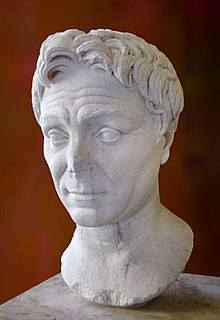Pompeius
Gnaeus Pompeius Magnus (Classical Latin: [ˈgnae̯.ʊs pɔmˈpɛj.jʊs ˈmaŋ.nʊs]; 29 September 106 BC – 28 September 48 BC), usually known in English as Pompey /ˈpɒmpiː/ or Pompey the Great, was a military and political leader of the late Roman Republic. He came from a wealthy Italian provincial background, and his father had been the first to establish the family among the Roman nobility. Pompey's immense success as a general while still very young enabled him to advance directly to his first consulship without meeting the normal requirements for office. His success as a military commander in Sulla's second civil war resulted in Sulla bestowing the nickname Magnus, "the Great", upon him. He was consul three times and celebrated three triumphs.
In mid-60 BC, Pompey joined Marcus Licinius Crassus and Gaius Julius Caesar in the unofficial military-political alliance known as the First Triumvirate, which Pompey's marriage to Caesar's daughter Julia helped secure. After the deaths of Julia and Crassus, Pompey sided with the optimates, the conservative faction of the Roman Senate. Pompey and Caesar then contended for the leadership of the Roman state, leading to a civil war. When Pompey was defeated at the Battle of Pharsalus in 48 BC, he sought refuge in Egypt, where he was assassinated. His career and defeat are significant in Rome's subsequent transformation from Republic to Empire.
...
Wikipedia

